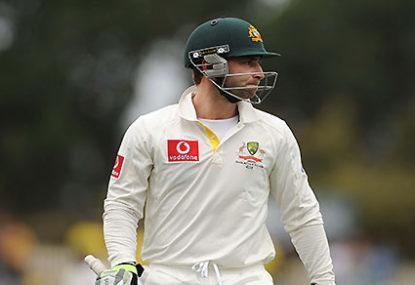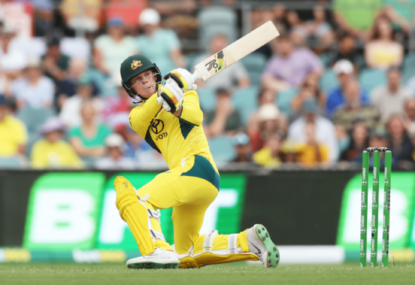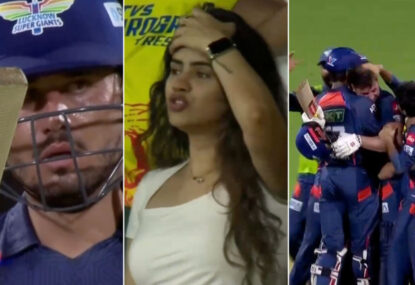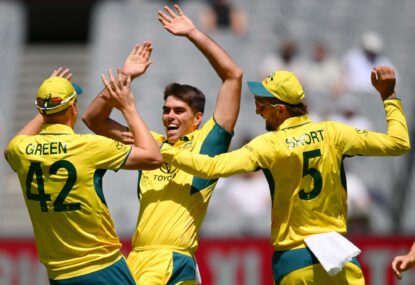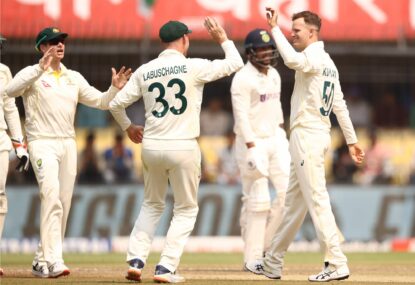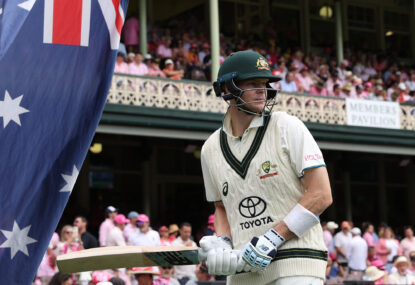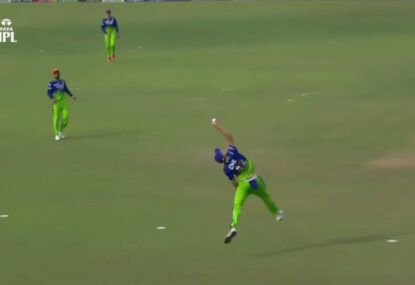A year ago to this day, batting for his spot in the Test team to face India at the Gabba, Phillip Hughes was struck on the back of his head by a bouncer at the SCG while his Redbacks were playing the NSW Blues.
Knocked unconscious by the blow, Hughes dropped to the ground, with frantic, panicked calls for an ambulance, a doctor, someone to help the fallen batsmen. He was rushed to a nearby hospital, and placed in an induced coma, with all Sheffield Shield matches called off.
On November 27, it will be a year to the day which saw Hughes pass away at St Vincent’s Hospital in Sydney, his family and friends by his side.
It is almost surreal to think such a horrific event, one that altered the course of cricket, is nearly a year old, and the monumental changes cricket and its players have undergone.
The cricket community, one distraught by tragedy but brought together by grief, was the epitome of the spirit of the game.
Every cricketer and every sportsperson was affected by this shocking death. Those playing cricket for their country in front of tens of thousands of people, to those playing park cricket under the hot Australian sun, to the children playing with the cardboard bat on the dusty streets of India, were all affected in differing ways.
Sports stars Tim Cahill, Mile Jedinak and Rafael Nadal all offered their tributes in different ways, as well as sports clubs such as Melbourne Victory and Adelaide United, whose fans gave a round of applause at the 63rd minute of an A-League game, Hughes’s score at the time he was struck.
It is compelling to ask ourselves why such an outpour of grief surrounded Hughes’s death. A man of 25, his death was tragic, yes, but not uncommon. Deaths at 25 are seen regularly worldwide, whether it be due to war, car crashes or accidents.
Yet it was not that Hughes died, but the circumstances in which he did pass, which affected the globe in such a way. A man doing what he loved, playing a sport that takes the harsh realities of life away, even for a moment, brought down in the prime of his life was what hit the hardest.
A cricket lover since I was born, Hughes’s death hit me harder than expected. For a man I never knew, his death was a shock, saddening and cruel. It was almost as if it were a dream, unreal in terms of watching highlights of the man and trying to convey to myself that I would never see him bat again.
Sportspeople have died on the field before, yes, but their deaths have been due to inborn pre-dispositions, genetics that are not attributed to the sport. While dangerous to an extent cricket is not meant to hurt anyone, not to the point of death.
Cricket training, the night that it was announced that Hughes had passed away, was eerie. A quiet night, any jokes felt out of place, a club, and a sport, in mourning. As cricket balls flew past my head, it was strange to now think that they could kill me. Unlikely, but now a possibility.
While there have been cases of people dying on a cricket field, Raman Lamba died while being struck on the head at short leg, none have had the impact that Hughes’s death did. And this is simply put down to the symbol of the man.
A young country boy with a homegrown technique who made a mountain of runs. Raised on a cattle farm, his simple-mindedness complimented his loveable personality around his teammates. Many alike looked up to Hughes.
Will Agar, the younger brother of Ashton Agar, reported to have loved watching Hughes bat at Trent Bridge just as much as his own brother, who scored his famous 98 at Notts. A symbol of a country boy, batting for his country and enjoying every minute of it, his eventual death made us all seem mortal. The idea that even cricket now was not a place where all were indestructible.
It was a bitter blow to the Australian public, that a man, a boy in the prime of his life, doing what he loved, was brought down by what he loved.
His funeral, the final farewell to a man of just 25 years, was attended by hundreds, and witnessed by hundreds of thousands. It was one of the most heart-wrenching things to have witnessed, as tributes poured in from family members and friends.
Two speeches hit me harder than most. While his sister, Megan Hughes, brought most of the packed hall in Macksville to tears, it were the speeches from his brother, Jason, and the Australian captain, Michael Clarke which stood out.
Jason Hughes, with a letter between brothers, gave the outer workings of society a beautiful look into their loving relationship, and made those in Macksville all understand the loss he was feeling and the love he held for his friend since birth.
Michael Clarke, the symbol of Australian sport, the captain of our country, crying in front of hundreds while giving his final address to his best friend. It was raw emotion and finally the Australian public saw a true leader in Clarke.
After that speech, and what he did for Hughes’s family and friends, Clarke’s ability to lead out the Australian team not a week later laid testimonial to his character. It is disgusting for John Buchanan to claim that Clarke does not truly represent the baggy green.
The baggy green is Australian culture, and Clarke’s actions in that eight-day period emanates the true spirit of Australian culture.
Looking a year onwards, it is obvious how much Hughes has changed cricket as a whole. Masuri has introduced a ‘stemguard’, a honeycomb guard on the back of the helmet where Hughes was struck.
The retirements of Chris Rogers, Shane Watson, Mitchell Johnson and Clarke should be noted as being partially brought upon by Hughes’s death.
The recent death of Namibian cricketer Raymond van Schoor highlights once more the fragility of life, and has affected cricketers worldwide again, and while not gaining the same outpour of support that Hughes got, it still has no doubt shook cricket once again.
Hughes’s death altered the cricketing and sporting communities in ways that could not possibly have been imagined. Tributes ranged from the greats of the game, such as Brian Lara, Sachin Tendulkar, Ricky Ponting and Shane Warne, to men in small suburbs, offering the simple gesture of leaving a cricket bat out on the front porch as a mark of respect.
It has been one year since that fateful day, a day that has changed every cricketer, and every sportsman. As the final Test of the New Zealand-Australia series approaches at the Adelaide Oval, the adopted home ground of Hughes, and the place where Australia paid their respects in the best possible way against India, it is fitting to see the two teams affected most by this tragedy remember Hughes through the game he loved.
Hughes was the symbol of Australian cricket. A country boy fighting his way into the big league to play alongside the best in the world, smacking balls and making runs.
We will see you soon, Phillip, watching you smack cover drives and back-foot cuts through the outfield where the immortals play.
Rest easy mate. Forever 63 not out.





























































































